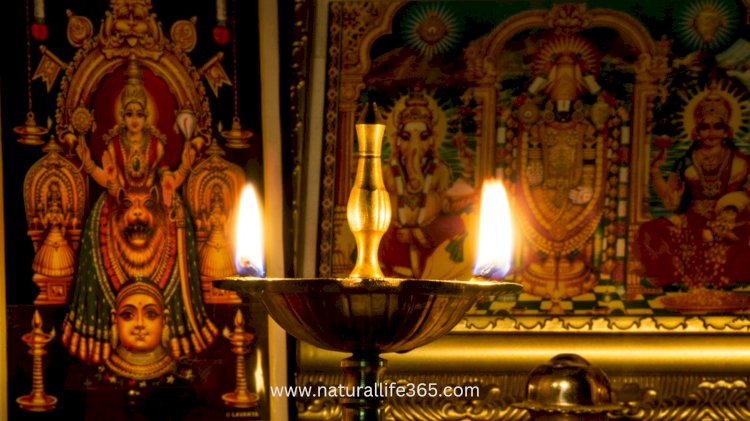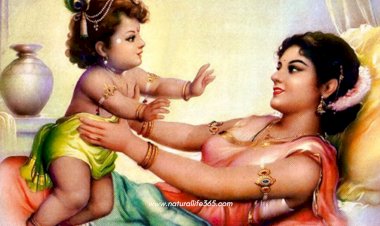The Dos and Don'ts of a Hindu Puja Altar
Discover the essential Dos and Don'ts for setting up a Hindu Puja Altar. Create a sacred space with these tips for meaningful worship.

The Hindu Puja Altar serves as a sacred space for worship, meditation, and spiritual connection. It is a place where devotees pay homage to their deities and seek divine blessings. However, performing rituals and maintaining an altar comes with certain guidelines and practices that must be followed with utmost reverence and sincerity.
In this blog, we will explore the essential dos and don'ts of a Hindu Puja Altar, providing valuable insights to ensure proper conduct, arrangement, and respect for this sacred space. By adhering to these guidelines, one can deepen their spiritual experience and establish a harmonious connection with the divine forces.
Maybe you want to read Why Do Hindus Have Altars at Home?
The Dos of a Hindu Puja Altar
Selecting a Sacred Space and Positioning the Altar
Selecting the right space for your Hindu Puja Altar is crucial for creating a serene and spiritually charged environment. Consider the following guidelines when choosing the location and positioning the altar:
- Choose a quiet and peaceful area: Find a space in your home that is free from distractions and noise. Ideally, select a room or a corner where you can create a dedicated spiritual atmosphere.
- Respect the direction: In Hinduism, certain directions hold specific significance. Align your altar facing east or north, as they are considered auspicious and associated with positive energies.
- Ensure cleanliness: Prioritize cleanliness in the chosen space. Keep it tidy and free from clutter. Regularly clean and dust the area to maintain a pure and sacred environment.
- Provide proper lighting: Natural light or soft, gentle lighting can enhance the ambiance of the altar. Place the altar near a window or use candles or lamps to create a serene glow.
- Consider the size and height: Choose an appropriate size and height for the altar based on your preferences and available space. Ensure it is easily accessible and comfortable for performing rituals and offering prayers.
By carefully selecting a sacred space and positioning the altar, you create an environment conducive to spiritual practice, enabling a deeper connection with the divine during your puja rituals.
Essential Items and Decorations for the Altar
Creating an aesthetically pleasing and spiritually charged Hindu Puja Altar involves incorporating essential items and decorations that enhance the sanctity of the space. Consider the following elements:
- Idols or images of deities: Choose the idols or images of deities that you worship. Ensure they are made of appropriate materials, such as metal or stone, and depict the deities accurately.
- Incense and candles: Use fragrant incense sticks and candles to purify the atmosphere and create a divine ambiance during the puja. Opt for natural and non-toxic options.
- Puja accessories: Arrange essential puja accessories like a bell, conch shell, arati lamp, and a small vessel for holy water (Kalash) on the altar. These items are used during ritualistic worship.
- Sacred scriptures: Place holy books such as the Bhagavad Gita, Ramayana, or the Vedas on the altar. These scriptures are revered and serve as a source of spiritual guidance.
- Flowers and garlands: Decorate the altar with fresh flowers and garlands, symbolizing beauty, devotion, and offering to the deities. Choose seasonal flowers and arrange them aesthetically.
- Offering bowls and plates: Use small bowls or plates made of metal or clay for offering food (prasad), fruits, and other sacred substances during the puja.
- Symbols of auspiciousness: Incorporate auspicious symbols like the Swastika or Om symbol on the altar. These symbols represent positive energies and bring prosperity.
Remember, the selection of items and decorations for the altar should align with your religious beliefs and the deities you worship. Each element serves to create an environment of devotion, reverence, and spiritual connection during your puja rituals.
Proper Cleansing and Purification Rituals
Maintaining the purity of a Hindu Puja Altar is of utmost importance to create a sanctified space for worship and spiritual practices. Follow these cleansing and purification rituals to ensure the altar remains spiritually charged:
- Cleanse the altar: Before starting any puja, ensure that the altar is clean and free from dust or dirt. Use a soft cloth or brush to gently wipe the surface of the altar and the items placed on it.
- Use sacred water: Sprinkle holy water (such as Gangajal or water mixed with turmeric) on the altar and the idols to purify them. You can also use a small brush or your fingertips to sprinkle the water lightly.
- Light dhoop or incense: Light incense sticks or dhoop and carefully pass it over the altar and the idols in a clockwise direction. The fragrant smoke purifies the surroundings and creates a sacred atmosphere.
- Perform Pran Pratishtha: This ritual involves infusing the idols with divine energy. Chant mantras or prayers while visualizing the deities' presence, inviting their divine essence into the idols.
- Offer Tulsi leaves: Place fresh Tulsi (holy basil) leaves on the idols or around the altar. Tulsi is considered sacred and purifying, and its presence enhances the sanctity of the space.
- Maintain regular cleaning: Regularly dust and clean the altar to ensure its cleanliness and purity. This practice helps in preserving the positive vibrations and sanctity of the space.
By following these cleansing and purification rituals, you create an environment that is spiritually pure and conducive to deepening your connection with the divine. These practices also signify your respect and devotion towards the deities and the puja altar.
Following Traditional Rituals and Practices During the Puja
When performing puja at your Hindu Puja Altar, it is essential to follow traditional rituals and practices to maintain authenticity and receive the maximum spiritual benefits. Consider the following guidelines:
- Offer prayers and chant mantras: Begin the puja by offering prayers and reciting mantras that are specific to the deities you worship. Chanting these sacred sounds invokes divine blessings and establishes a spiritual connection.
- Light the lamp: Light the arati lamp using ghee or camphor and circulate it in a clockwise direction in front of the deities. This ritual symbolizes dispelling darkness and inviting divine illumination.
- Offer flowers and fruits: Offer fresh flowers, preferably with their stems intact, to the deities as a sign of devotion. Place fruits, sweets, or prasad in the offering bowls or plates on the altar.
- Perform Abhishekam: If applicable, perform the ritual of Abhishekam, which involves pouring sacred liquids like milk, honey, or water on the idols as a symbol of purification and reverence.
- Practice meditation and contemplation: Take a moment during the puja to sit in meditation or contemplation, focusing your mind on the divine presence and absorbing the spiritual energy of the puja.
- Express gratitude and seek blessings: Conclude the puja by expressing gratitude to the deities for their blessings and seeking their continued guidance, protection, and divine grace in your life.
By adhering to these traditional rituals and practices, you honor the rich spiritual heritage of Hinduism and create a meaningful and authentic puja experience. Embrace the essence of devotion, faith, and reverence while performing the puja at your sacred Hindu Puja Altar.
The Don’Ts of a Hindu Puja Altar
Avoiding Clutter and Disorganization on the Altar
Maintaining a clean and organized Hindu Puja Altar is essential to uphold its sanctity and ensure a focused and harmonious worship experience. Avoid the following clutter and disorganization on the altar:
- Avoid overcrowding: Do not overcrowd the altar with too many idols or decorative items. Select a few significant deities or representations to maintain a sense of simplicity and clarity.
- Keep it tidy: Avoid cluttering the altar with unnecessary items or personal belongings. Keep the surface clean and free from dust, ensuring that only the essential puja items and decorations are present.
- Arrange items systematically: Organize the items on the altar in a systematic manner. Place the idols or images of deities in the center, with the other puja accessories and offerings positioned appropriately around them.
- Maintain orderliness: Ensure that the puja items, such as incense, candles, and flowers, are neatly arranged and easily accessible. This promotes a sense of orderliness and facilitates the smooth execution of the rituals.
- Avoid unrelated items: Refrain from placing unrelated or secular objects on the puja altar. Keep it dedicated solely to spiritual items and avoid mixing it with everyday items or personal belongings.
- Regularly declutter and update: Periodically review and declutter the altar, removing any worn-out or expired items. Replace wilted flowers, dispose of old offerings, and maintain a fresh and vibrant atmosphere.
By avoiding clutter and disorganization on the altar, you uphold the sacredness of the space and create an environment that fosters concentration, devotion, and reverence. A well-maintained and organized puja altar enhances the spiritual experience and allows for a deeper connection with the divine.
Respecting the Sacredness of the Altar and Its Items
Respecting the sacredness of the Hindu Puja Altar and its items is crucial to maintaining the sanctity and reverence of the worship space. Consider the following guidelines:
- Avoid touching the idols with unwashed hands: Washing your hands before touching the idols or any sacred items on the altar is important. This shows respect and ensures cleanliness.
- Avoid cleaning the altar with dirty clothes: It is important to clean your altar with clothes that are used specifically and just for your altar. This means that the clothing you will use should not be used again in the kitchen or for any other purpose than don’t be for your altar.
- Refrain from eating or drinking near the altar: Avoid consuming food or beverages near the puja altar. This prevents any accidental spillage or contamination of the sacred space.
- Do not place non-religious items on the altar: Reserve the puja altar solely for religious and spiritual items. Avoid placing unrelated objects or secular items on the altar to maintain its sanctity.
- Handle the items with care: When handling the puja items such as lamps, bells, or bowls, do so with utmost care and gentleness. Treat them with reverence and avoid any mishandling or careless behavior.
- Avoid stepping on or crossing over the altar: Show respect to the puja altar by refraining from stepping on it or crossing over it. This helps maintain the purity and sacredness of the space.
- Seek guidance for complex rituals: If you are unsure about specific rituals or practices, seek guidance from a knowledgeable person or a priest. It is important to perform the rituals correctly to honor the traditions and show respect.
By respecting the sacredness of the altar and its items, you acknowledge the divinity present within them and create an atmosphere of reverence and devotion. Cultivating an attitude of respect towards the puja altar enhances the spiritual experience and deepens your connection with the divine.
Prohibitions Regarding Personal Hygiene and Attire
Maintaining proper personal hygiene and adhering to appropriate attire while engaging with the Hindu Puja Altar is essential to uphold the sanctity and reverence of the worship space. Consider the following guidelines:
- Avoid attending the puja when unclean: Refrain from participating in the puja if you are physically unclean, such as after using the restroom or without having taken a bath. It is important to be in a state of cleanliness before engaging in worship.
- Remove footwear before approaching the altar: Remove your footwear before entering the puja area. This practice signifies respect for the sacredness of the space and helps maintain cleanliness.
- Dress modestly and conservatively: Wear modest and respectful attire when attending the puja. Avoid revealing or inappropriate clothing that may distract from the focus of the worship.
- Refrain from wearing non-religious accessories: Avoid wearing accessories or jewelry that may be considered non-religious or distracting during the puja. Keep the focus on the spiritual significance of the worship.
- Avoid strong scents and perfumes: Refrain from wearing strong scents or perfumes that may overpower the natural fragrance of the flowers, incense, or other offerings used during the puja.
- Keep personal belongings away from the altar: Avoid placing personal belongings or accessories on the puja altar. Keep it dedicated solely to the puja items and maintain its sacredness.
By adhering to these prohibitions regarding personal hygiene and attire, you demonstrate respect and reverence for the puja altar. Following these guidelines ensures a focused and sacred environment for worship, allowing for a deeper spiritual experience and connection with the divine.
Understanding Cultural and Religious Taboos
Respecting cultural and religious taboos is essential when engaging with a Hindu Puja Altar. Being aware of these taboos helps maintain the sanctity and integrity of the worship space. Consider the following guidelines:
- Refrain from pointing fingers at the deities: Pointing directly at the deities with fingers is considered impolite. Instead, use an open palm or the entire hand when gesturing toward the divine representations.
- Do not use the left hand for offering or receiving: In Hindu culture, the left hand is considered impure. When offering or receiving prasad or any other sacred item during the puja, always use the right hand.
- Avoid eating non-vegetarian food near the altar: Hinduism promotes vegetarianism as a way of honoring all forms of life. Refrain from consuming non-vegetarian food or bringing it near the puja altar to maintain the sanctity of the space.
- Respect the sacredness of prasad: Prasad is considered blessed food that has been offered to the deities. Avoid wasting or disrespecting Prasad by consuming it with utmost reverence and gratitude.
- Refrain from sitting with legs stretched out: Sitting with legs stretched out or pointing towards the altar is considered disrespectful. Maintain a respectful posture with legs folded or crossed while engaging with the puja.
Understanding and respecting these cultural and religious taboos associated with the Hindu Puja Altar demonstrates sensitivity toward the traditions and beliefs. By honoring these taboos, you contribute to the sacredness and integrity of the worship space, fostering a deeper spiritual connection with the divine.
Conclusion
In conclusion, the Hindu Puja Altar holds great significance in fostering a spiritual connection with the divine. By adhering to the dos and avoiding the don'ts, we create an atmosphere of reverence, purity, and devotion. Selecting a sacred space, positioning the altar, incorporating essential items, following traditional rituals, respecting the sacredness, and understanding cultural taboos all contribute to a meaningful puja experience.
Maintaining a clean and organized altar, performing proper cleansing and purification rituals, dressing appropriately, and showing respect for the sacredness of the items are essential aspects of upholding the sanctity of the worship space. By practicing mindfulness and adhering to these guidelines, we create a space that is conducive to deepening our connection with the divine, receiving blessings, and experiencing spiritual growth.
The dos and don'ts mentioned in this guide are not just rules to follow, but reflections of the values and traditions that have been passed down through generations. They hold the power to enhance our puja experience, infusing it with sincerity, devotion, and reverence. As we engage with the Hindu Puja Altar, let us remember the importance of honoring these practices and embracing the spiritual essence they offer.
May the puja altar be a sacred haven where we connect with the divine, seek guidance, and find solace. Let us approach it with humility, gratitude, and a deep sense of devotion, knowing that through these practices, we embark on a profound spiritual journey that nourishes our souls and brings us closer to the divine presence within and around us.
If you value these free online resources provided by Natural Life 365, please consider supporting my website by sharing the blogs ![]()
DISCLAIMER:
Some of the links in this content may be affiliate links. This means that if you click on one of the links and make a purchase, I may receive a commission (at no extra charge to you). However, I only recommend products that I personally use and have tested myself. Also, understand that I have taken reasonable steps to ensure that the information on this content is accurate, but I cannot represent that the website(s) mentioned in this post are free from errors. Please, check the Affiliate Disclosure at the bottom of this website.








































